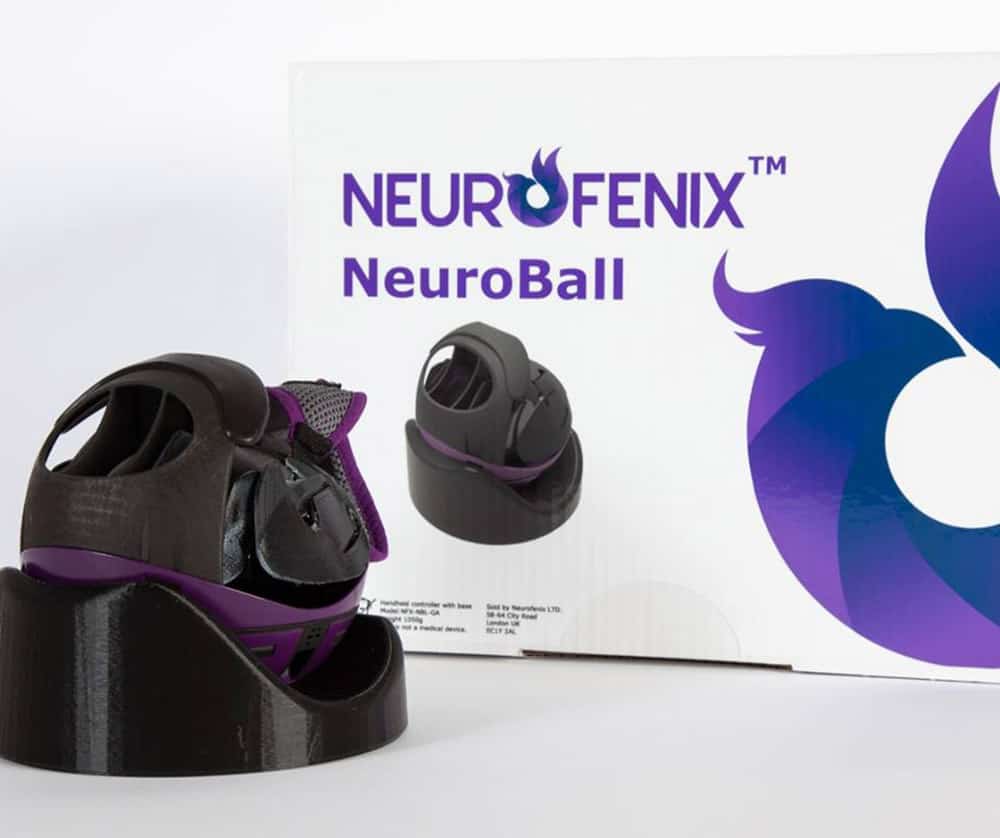“Ground-breaking” gaming controller boosts stroke survivors’ chances of regaining full arm and hand use

A first-of-its-kind gaming device that has been shown to significantly improve the outcomes of stroke survivors by helping them regain strength and movement in their arms and hands has been launched.
Created by Neurofenix, a London-based team of engineers, medical experts and designers, the NeuroBall is a one-size-fits-all ‘controller’ that enables stroke survivors to play video games via an app, which makes their regular rehabilitation exercises entertaining and fun.
The NeuroBall was developed over a two-year period in conjunction with stroke survivors, their families, therapists and physicians. In 2018, the NeuroBall received the first Inventor Prize and was awarded £50,000 to help bring the product to market.
Neurofenix wanted to create something that would encourage stroke survivors to keep doing the vital daily exercises that are crucial to regaining upper limb use.
In preliminary trials, Brunel University London carried out a study with Neurofenix involving 30 stroke sufferers using the NeuroBall and app at their homes for seven weeks. Users of the NeuroBall reported improved wrist and shoulder movement and reduced impairment of the arm, as well as greater social participation.
With 1.5 million stroke survivors in the UK, this self-administered home-based rehab method could be a huge help to an increasingly overstretched health system.
NeuroBall user Shona Patterson, who had a stroke four and a half years ago, said: “Trying to motivate yourself is quite hard. I was getting bored with my daily routine of stretching and lifting weights. One day after I had finished using the NeuroBall, I checked the level I could reach with my hand and discovered I could put my hand on top of my head, which was the first time I had ever been able to do that. I could do it straightaway.
“I was ranting about how excited I was because it is amazing after four and a half years to still feel you can achieve things.”
According to Neurofenix, 85 percent of stroke survivors experience arm weakness or paralysis and only 20 to 56 percent regain complete movement and control within three months, after which most people are discharged from inpatient rehab to continue their recovery training at home.
Once home, there is a high dropout rate from the daily exercises that are usually considered boring and repetitive and, without continued support, forgotten or ignored. This means many people never recover full motor control of their effected arm and hand.
The Brunel University-Neurofenix study showed that despite being primarily older, with an average age of 60, and varying levels of mental and physical impairment, the test group were able to learn how to use the NeuroBall and app independently at home after just 98 minutes of training.
They played an average of 17.4 hours, or 149 minutes per week, exercising their arm 15,092 times with minimum input of just 2.3 hours from the Brunel physiotherapists. Within an hour of play, NeuroBall users are able to complete 840 exercise repetitions, or 14 per minute.
Animal studies on neuroplasticity demonstrate that 400 to 600 repetitions per day of challenging functional tasks can lead to changes in the brain.
The National Institute for Health and Care Excellence (NICE) recommends a minimum of 45 minutes of each active therapy for stroke sufferers at least five days a week but current data shows most patients do not achieve this.
UK Neurologist Professor Nick Ward, consultant at the National Hospital for Neurology and Neurosurgery, said: “Currently stroke survivors are not getting the rehabilitation that they need and this is having a significant impact on the extent of recovery each person can expect. They will need improved access to specialists who can show them what they need to do in order to achieve the best recovery.
“Emerging technologies, such as the NeuroBall, can play a role in encouraging people to perform higher amounts of the right activities, and can do it in a way that might be more entertaining than traditional exercises.
“In addition, these technologies afford the possibility to measure activity and performance so that the person’s progress can be monitored and the treatment can be adjusted to maximise individual benefit.”
Neurofenix aims to make rehabilitation more autonomous, enjoyable and accessible to stroke survivors.
Guillem Singla Buxarrais, Co-Founder and CEO of Neurofenix, commented: “Research into stroke rehabilitation shows that intensity of practice is a key factor in meaningful recovery. The more practice, in terms of both training time and increased repetitions, the better. The problem is that for most people, integrating this into their daily lives becomes a bore.
“This is where the NeuroBall has proven so successful as it makes the repetitive exercises something fun and sociable. It enables stroke survivors to complete hundreds of repetitions in the comfort of their own home without even thinking about it.
“This gaming tool can help hospitals and physios increase their patients’ training to get better results with a minimum time and money investment.”

